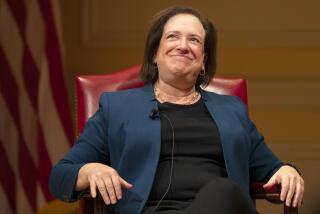FCC appeals court ruling on indecency rules
- Share via
The Federal Communications Commission fired back at a federal appeals court that said the regulatory agency’s enforcement of its indecency rules was “unconstitutionally vague” and had a “chilling effect.”
The FCC filed an appeal Thursday asking the three-judge panel of the U.S. 2nd Circuit Court of Appeals in New York to reconsider its July decision that tossed out the regulatory agency’s enforcement policies regarding indecent programming.
The 2nd Circuit’s ruling came in response to a fight between the FCC and News Corp.’s Fox Broadcasting over so-called fleeting expletives. The FCC ruled in 2004 that television stations could be fined for indecency violations in cases when, during a live program, a vulgarity was broadcast. That happened on Fox in 2002 and 2003 when Cher and Nicole Richie cursed during award shows and were not bleeped.
The FCC never fined Fox, but the network took issue with the agency setting the stage for future fines and challenged the fleeting-expletive rules in court. At the same time, broadcast networks started going to greater lengths to ensure that no swear words accidentally slipped through their censors, including running most live shows with delays. The FCC’s indecency rules apply from 6 a.m. to 10 p.m.
Although Fox’s appeal to the 2nd Circuit court focused on the fleeting expletives, the court’s ruling went a step further and said the FCC’s enforcement of the rules was harmful to free speech.
“Under the current policy, broadcasters must choose between not airing or censoring controversial programs and risking massive fines or possibly even loss of their licenses, and it is not surprising which option they choose,” Circuit Judge Rosemary S. Pooler wrote in the 3-0 decision. “Indeed, there is ample evidence in the record that the FCC’s indecency policy has chilled protected speech.”
In its appeal, the FCC said the court overstepped its bounds. Rather than address the constitutionality of banning fleeting expletives, “it instead invalidated the agency’s overall approach to indecency enforcement.” The agency chastised the court for reaching this decision, “even though the Supreme Court approved the commission’s contextual approach in FCC vs. Pacifica.”
The 1978 Pacifica decision was the foundation of the FCC’s current indecency regulations. It came about as a result of a radio broadcast of the late comedian George Carlin’s “Seven Dirty Words” routine.
“The three-judge panel’s decision in July raised serious concerns about the commission’s ability to protect children and families from indecent broadcast programming,” Austin Schlick, the FCC’s general counsel, said in a statement. “The commission remains committed to empowering parents and protecting children, and looks forward to the court of appeals’ further consideration of our arguments.”
joe.flint@latimes.com
More to Read
The complete guide to home viewing
Get Screen Gab for everything about the TV shows and streaming movies everyone’s talking about.
You may occasionally receive promotional content from the Los Angeles Times.







